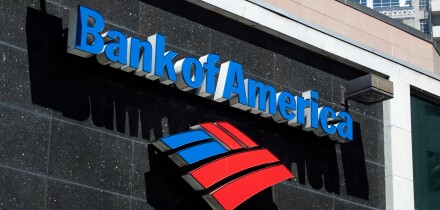The Chicago Board Options Exchange introduced cash-settled bitcoin futures last Sunday, while its competitor Chicago Mercantile Exchange plans to launch its offering on December 18. CBOE's futures exchange saw 7091 contracts traded between Monday and Wednesday.
“I have been speaking to several people over the last couple of days, including the regulators, and I have never known such a buzz around the launch of a product,” said Andrew Wilkinson, chief market analyst at Interactive Brokers, a futures commission merchant for CBOE bitcoin futures.
He added that he expected bitcoin futures would give the asset more legitimacy and a broader audience, while anticipating that options would be next on the CME and CBOE's shopping lists.
The contract underlying for CBOE’s bitcoin futures is the price of one bitcoin, ascertained from its auction price on digital asset exchange Gemini.
Interactive Brokers, which caters to professional investors, has seen a spate of new accounts opened as investors were pointed in their direction from the CBOE Futures Exchange. On Wednesday, the company said that it had handled approximately 50% of the volume since trading started.
Short trading came to the company’s trading platform on Wednesday, with $40,000 margin demanded for a single contract. Going long required less than a quarter of that figure for margin, at $9,000. Both the figures are subject to change given conditions in the underlying market.
“If you want to get involved in being short bitcoin, you can consider the margin as acting as a deterrent, but it is certainly sufficient to cover the event that the client gets caught in a locked market and they will wear though their money before they wear though our money,” added Wilkinson.
Digital assets "here to stay"
While suffering wild swings in value, bitcoin has gone up 15-fold since the beginning of the year. As of 6.30pm on Thursday, bitcoin was resting at roughly $16,700 according to website coinmarketcap.com. Fragmentation in the underlying exchange spot market however, makes it difficult to provide an accurate price.
TradeStation, another brokerage firm offering clients exposure to CBOE bitcoin contracts, on Wednesday had between 10% and 15% of the transaction volume according to Nicholas LaMaina, senior vice president strategic brokerage services.
He added that the company was seeing interest across all of its customer segments, including retail investors, active traders and smaller institutional clients.
“As a firm, while we recognise that bitcoin is very volatile and that no one knows what is going to happen to its value, we feel that the utility of digital assets and blockchain is here to stay,” he said.
Blockchain is the technology underlying bitcoin and other virtual currencies, and involves a decentralised ledger of transactions that anyone can access. “Miners” contribute computer power to package up and verify the transactions, thus putting them on the blockchain.
While there is a lot of excitement about the astonishing volatility and rise in value of bitcoin, Edmund Parker, global head of derivatives at Mayer Brown in London, suspects that it has the hallmarks of a bubble, noting that its wild swings in value make it difficult to use as a day-to-day currency.
“Trading shares did not end because of the 1929 crash, derivatives and securitization did not end because of what happened in 2007 and 2008,” he said, acknowledging that cryptocurrencies have useful traits.
“For example, they are a store of value that is not controlled by governments, which can be useful in countries where the official currency has lost its value: gold version 2.0.
“But at the same time, I’m not sure cryptocurrencies are mature enough as an asset class to survive anything that’s thrown at them.”
Exchanges take note
Meanwhile in Europe, a spokesperson for derivatives bourse Eurex told GlobalCapital on Thursday that if there was client demand, the exchange would overcome challenges plaguing bitcoin to allow futures trading.
“While cryptocurrencies indeed are an interesting asset class, there are a number of potential issues that we think need to be addressed first before launching any related products," said the spokesperson.
"For us as a fully regulated exchange it is key to follow a sustainable approach on this asset class, in close coordination with the market and regulators."
Price discovery and lack of regulation of the spot market were just some of the issues she brought up, adding that the margin methodology for bitcoin futures would have to address the volatility inherent to the asset class.
Regulatory concerns
The news comes as Jay Clayton, the chairman of the Securities and Exchange Commission in the United States warned main street investors and market professionals about the potential dangers of cryptocurrencies on Tuesday (see online story).
“There are tales of fortunes made and dreamed to be made,” he said. “We are hearing the familiar refrain, “this time is different”.
He added that brokers should “exercise particular caution” when allowing customers to buy cryptocurrencies on margin, encouraging them to make sure they are adhering to anti-money laundering and know-your-customer rules.
The Commodity Futures Trading Commission, the United States’ derivatives regulator, approved the futures contracts for CBOE and CME on December 1.
Bitcoin futures fell into the regulator’s purview after it declared the underlying a commodity in a 2015 order against Coinflip, a bitcoin options and futures platform.
The CFTC determined that "services, rights and interests in which contracts for future delivery are presently or in the future dealt with" are commodities, dragging virtual currencies into scope, which did not have "legal tender status in any jurisdiction".
Parker said he was sure that regulators will keep a close eye on bitcoin, but was surprised that they got authorised in the first place.
“It is surprising that regulators would green light this asset class, at a time when they really want to increase confidence in the derivatives market,” he said.







